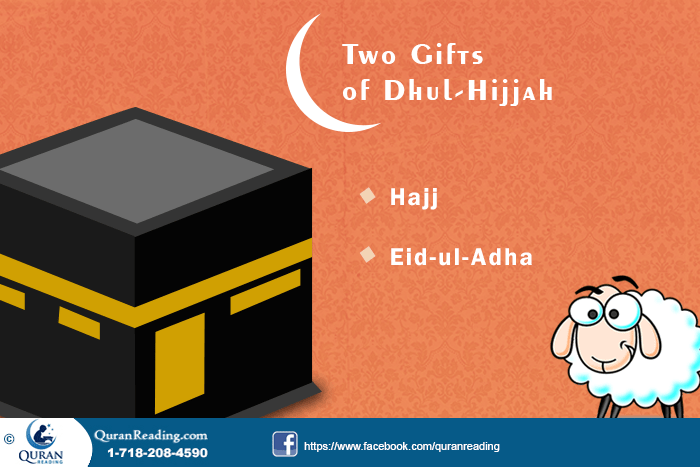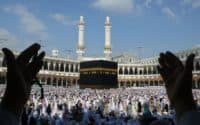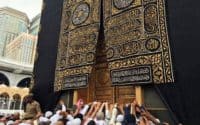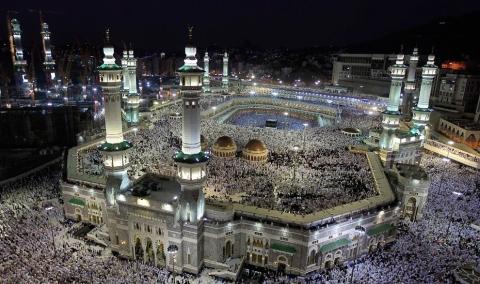
Hajj And Eid-Al-Adhaa – Two Gifts Of Dhul-Hijjah

Allah Almighty has blessed Muslims in a special way where He has attributed different Islamic months with different events of great religious reward and significance. Out of the 12 Islamic lunar calendar months, Ramadan is perhaps the most renowned and popular as it comes with Fasting and the festival of Eid-ul-Fitr. The second month that holds great importance in the Islamic calendar after Ramadan is Dhul-Hijja.
Dhul-Hijja is the 12th month of the Islamic calendar and is primarily known for the Hajj that Muslims perform in it and Eid-ul-Adha. Both these are the gifts that the month of Dhul-Hijja brings for Muslims and because of these this month enjoys prominence over rest of the months. The lines below briefly discuss these glorious gifts of the month of Dhul-Hijjah.

Hajj:
Hajj is the annual pilgrimage, which Muslims pay to the house of Allah in Mecca. The event of Hajj comprises of a variety of rituals that Muslims perform all of which are directed towards worshiping Allah Almighty, submitting to Him and being grateful for what He has blessed the person with. Pertaining to Hajj, Allah Almighty says in Quran:
“Hajj is [during] well-known months, so whoever has made Hajj obligatory upon himself therein [by entering the state of ihram], there is [to be for him] no sexual relations and no disobedience and no disputing during Hajj. And whatever good you do – Allah knows it. And take provisions, but indeed, the best provision is fear of Allah . And fear Me, O you of understanding.” (2:197)
This ayah tells of the event of Hajj that is to be performed in the month of Dhul-Hijja. The event is a sacred one and it stands as the fifth pillar of Islam, so there should be no doubt in the mind of a Muslim believer that this event holds grave importance in Islam and there are very few events that equal its magnanimity.
In Islam great stress has been put on performing the rites of Hajj and the Hajj in totality. Muslims are encouraged to perform Hajj as soon as they have the means and health of doing so. In this regard Prophet Muhammad (PBUH) said in one of His hadiths:
“Expedite the performance of Hajj. For nobody knows what may obstruct one.” (Ibn Majah)
From this hadith it is clear that one must hurry in performing of Hajj. People usually set the objective of Hajj for the later years of their life of which they have no guarantee. Therefore, the stress that Prophet (PBUH) has put on its performing at the earliest makes the importance and significance of Hajj imperative.
In another hadith, Prophet Muhammad (PBUH) said:
“One who comes to this House for Hajj and avoids all lewdness and sins, he returns as he was on the day his mother gave birth to him.” (Bukhari and Muslim)
This ayah goes on to show the prime benefit of performing Hajj – absolution from sins. It is the objective of every Muslim that he or she gets rid of all the sins which they have committed either intentionally or unintentionally. Therefore, for all such Muslims the cure lies in performing of Hajj, however, the condition of performing it with true intentions applies. Thus, the absolution from sins is another key bounty of Hajj.
In addition to the prime bounty of absolution from sins, the event of Hajj also has great symbolic importance. At a symbolic level it represents the message of equality, universal brotherhood and submission to Allah where all the Muslims from different countries of the world with different ethnicities stand with one another and perform all the rituals without any discrimination with a single objective in mind – to praise and to be grateful to Allah Almighty for whatever He has bestowed upon them. Therefore, all these bounties show that Hajj is no less than a great gift from Allah Almighty.
Eid-ul-Adha:
The second jewel in the crown of the month of Dhul-Hijja is the Eid-ul-Adha. After Eid-ul-Fitr it is the second Eid which Muslims celebrate. This is the Eid of sacrifice which is celebrated as culmination of Hajj. When all the rites of Hajj are complete Muslims finish the rituals by sacrificing an animal in the name of Allah Almighty.
The celebration of Eid-ul-Adha is also in commemoration of the great sacrifice which Hazrat Ibrahim (AS) gave by slaughtering His son Ismail (AS) in the name of Almighty. Allah Almighty miracoulosly replaced Hazrat Ismail (AS) with a sheep when Hazrat Ibrahim (AS) was about to run the blade on His throat. Since then Muslims commemorate that event by slaughtering an animal on the 3days of Eid-ul-Adha, which are from 10th Duhul-Hijja to the 12th. Regarding Eid-ul-Adha, Allah Almighty says in Quran:
“And complete the Hajj or Umrah in the service of Allah. But if ye are prevented (from completing it) send an offering for sacrifice, such as ye may find and do not shave your heads until the offering reaches the place of sacrifice. And if any of you is ill or has an ailment in his scalp (necessitatin shaving), (he should) in compensation either fast, or feed the poor, or offer sacrifice; and when ye are in peaceful conditions (again) if anyone wishes to continue the Umrah on to the Hajj, he must make an offering such as he can afford, but if he cannot afford it, he should fast three days during the Hajj and seven days on his return making ten days in all. This is for those whose household is not in (the precincts of) the Sacred Mosque. And fear Allah, and know that Allah is strict in punishment.” (2:196)
This ayah makes it clear that one needs to offer a sacrifice whether or not he or she has gone to perform Hajj. This sacrificing of an animal in commemoration of the Sunnah of Prophet Ibrahim (AS) also comes with a great boost in the economy of a society where the sale and purchase of animals takes place at a massive level and the poor are also given equal right in the meat of the sacrifice. Thus, this way in addition to completing the order of Allah and Sunnah of Hazrat Ibrahim (AS), Eid-ul-Adha helps feed the poor ones who cannot afford to buy meat.
Conclusion:
In short, besides being religious ritual of grave importance both Hajj and Eid-ul-Adha have great symbolic importance. These events hold universality across the Muslim world and when they are performed, it gives a message of universal solidarity and submission to Allah in the Muslim world. Therefore, both these events of Dhul-Hijja are no less than a blessing.




